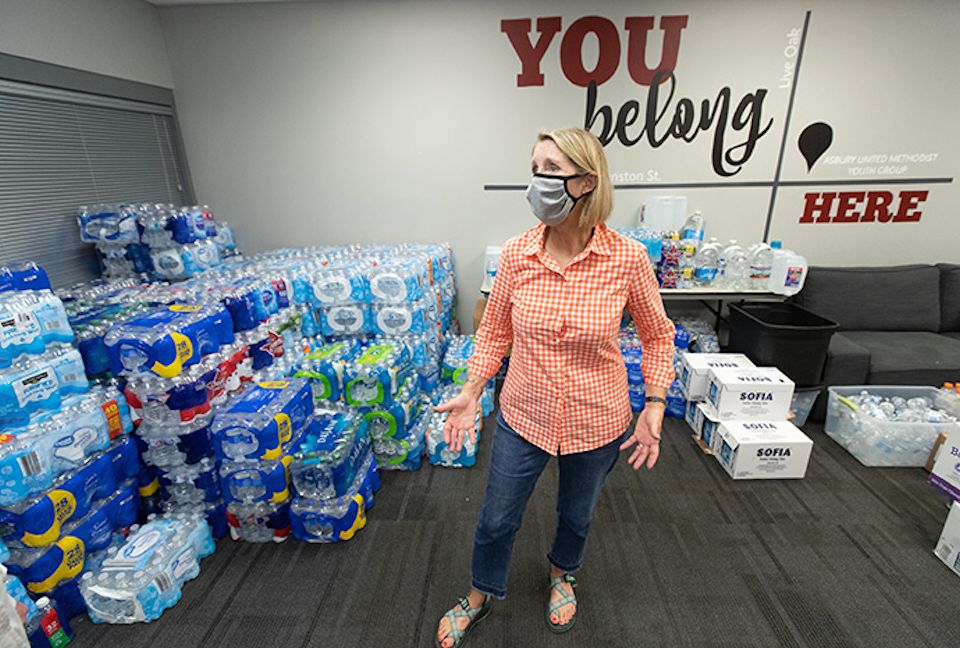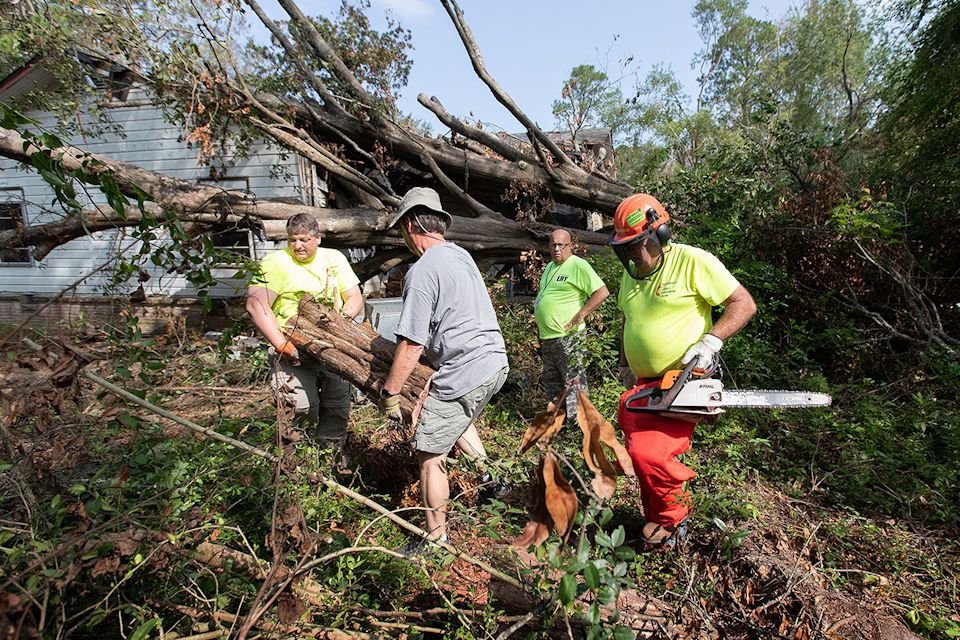Fatigue is real across the nation and church as persons cope with natural disasters, a pandemic, and personal crises. UMCOR is addressing the suffering on the gulf coast. Dollars and volunteers needed.
KATHY GILBERT | SAM HODGES
UM News
As Zeta, the 11th named storm to hit the U.S. this year was headed to the Gulf Coast, Louisiana Bishop Cynthia Fierro Harvey mused, “It seems like 777.”
Even just hurricane warnings disrupt daily life, she said in a video conversation with the Rev. Todd Rossnagel, Louisiana conference communicator. “We know we have to take that seriously.”
She finds comfort in Scripture and the hymn, “Great Is Thy Faithfulness.”
“The Good News is the good news, looking for mercies each and every day,” she said. “With bleary eyes, we try to focus on those things.”
And hurricane season doesn’t end until Nov. 30.
Zeta hit on Oct. 29. Damage along the Louisiana, Mississippi, and Alabama coasts fell short of catastrophic — but it was bad enough. And it was widespread. North Georgia and South Carolina United Methodist disaster response teams are still assessing the damage to their areas.
Of the 11 named storms to make landfall, five hit Louisiana — tropical storms Cristobel and Marco and Hurricanes Laura, Delta, and Zeta.
The Associated Press said at least six deaths are blamed on the storm. The number includes four people killed by falling trees in Alabama and Georgia, a man who drowned in Mississippi, and another man electrocuted by live power lines.
As many as 2.6 million homes and businesses reported power outages in Louisiana, Alabama, North Carolina, South Carolina, Mississippi, and Georgia.
Belle Chase United Methodist and Algiers United Methodist churches suffered some damage. The Rev. Collen Bookter, the pastor of the two churches, described Zeta’s winds as the strongest she’s ever experienced. The eye passed directly over her.
“It was surreal,” Bookter said. “After the intense wind, there was calm and stillness. Everyone then briefly gathered outside to check on one another. … Thankfully, most trees seemed to fall away from the houses. This morning has been all about teamwork. Walking the streets, checking on neighbors and church members, and clearing debris. This tight-knit community of Algiers Point is even tighter now.”
Bookter said she saw the presence of God in her neighbors.
“All of us are knocking on doors, calling others, and making sure that everyone is OK,” she said. “We are the hands and feet of Christ. If 2020 has taught us anything, it is that we are only going to make it through if we do this together.”
Zeta moved fast but packed a powerful punch. It came ashore just west of Cocodrie, LA, before moving over New Orleans and heading for Mississippi and Alabama.
“Most of us lost shingles, some lost whole roofs, lots of trees down,” said the Rev. Larry Hilliard, superintendent of the Mississippi Conference’s Seashore District. “I don’t think there’s a wood fence left in Hancock or Harrison counties.”

Hurricane Zeta damaged the roof of First United Methodist Church in Long Beach, MS. A limb crashed into the parsonage’s kitchen across the street, said the Rev. Jon Kaufman, senior pastor.
“We’ve got church members who have major damage, with parts of roofs gone,” he added.
Though power is expected to remain out for days in and around Long Beach, Kaufman hopes to have a parking lot church service on Sunday.
Hilliard reported that Gateway United Methodist Church, in Gulfport, MS, will need major roof repairs. “There are small holes in the sanctuary where you can see the sky,” he said.
Hurricane Zeta was unkind to Gulfside Assembly, a historic African American Methodist retreat and conference center in Waveland, MS, that was destroyed in Hurricane Katrina.
The first phase of the rebuilding was an open-air prayer chapel, named for the late United Methodist Bishop Leontine T.C. Kelly. Hilliard said Zeta damaged the chapel and a storage structure.
The storm flooded, blew down trees, or otherwise damaged 11 United Methodist churches in the Mobile, AL, area.
“My district administrator and I have been traveling since 10 o’clock this morning, handing out cleaning buckets and tarps,” said the Rev. Debora Bishop, Mobile District superintendent of the Alabama-West Florida Conference, on Oct. 29.
In the coastal Alabama fishing village of Coden, Coden United Methodist had 3 feet of water in its fellowship hall, Bishop noted.
Farther north in Mobile County, a metal roof blew across the highway and knocked down the wooden cross at Crawford United Methodist Church. A large water oak fell by a gazebo where its worship team has been leading outdoor services.
“We’ll meet somewhere on the grounds. We’re flexible,” said the Rev. Michele Statkewicz, pastor, about Sunday worship.
One of the hardest-hit communities was Citronelle, in northern Mobile County.
The Rev. Anthony Tutor was grateful that the massive, 200-year-old oaks in front of Citronelle United Methodist did not fall from what he suspects was a tornado that spun off from the storm.
But the church building will need some work.
“It’s got one strip of shingles missing,” Tutor said. “Some of the metalwork around the trim, the eaves, is buckled up. All in all, it’s not too bad.”
The town is without power, and downed trees and fences are widespread, including at the parsonage where Tutor lives.
“There’s nobody in Citronelle that doesn’t have damage,” he said.
Across Mobile Bay in Foley, AL, Pam Yaeger held a vigil during the late-night storm while her husband and son slept.
“I stayed up doing a lot of praying,” said Yaeger, an active member of Foley United Methodist Church. “I didn’t want to see anything else falling into the inside of my house, like last time.”
By “last time,” Yaeger meant Hurricane Sally, which blew through on Sept. 16. That storm caused widespread damage in and around Foley, including to Yaeger’s home.
Her roof is still tarped from Sally, and she could hear the wind rattling the covering as Zeta came through.
The Alabama-West Florida Conference has been asking for work teams to help with Hurricane Sally recovery. The Rev. Chris Ackerman, conference disaster response coordinator, stepped up the appeal after Zeta.
“We’re already ready to receive those volunteers because of what we’ve been through with Sally,” he said. “We’ve got the infrastructure to house them. We’ll take all the volunteers we can get.”
The Mississippi Conference will be using its Gulf Coast warehouses and volunteers in helping with recovery from the latest hurricane.
“We will do what we always do: pull together and meet those immediate needs,” said the Rev. Vickie White, director of connectional ministries.
“COVID-19 has created a national disaster and many churches and individuals may have their hands full with their own health, economic, relational disaster. So, more than ever, many people in disaster zones need those of us who have some capacity to show God’s love in practical, incarnational ways.” ~ Rev. Scott Parish
The Rev. Scott Parish, North Georgia, said he recently went to the Alabama-West Florida Conference in hopes of showing teams it is safe to go on mission teams.
With the pandemic and other national issues, 2020 is a rolling daily disaster, he said.
“COVID-19 has created a national disaster, and many churches and individuals may have their hands full with their own health, economic, relational disaster. So, more than ever, many people in disaster zones need those of us who have some capacity to show God’s love in practical, incarnational ways,” he said.
The continuing act of preparing is something Bishop Harvey has been focused on.
“The events of this year are cumulative and compounding in nature, and the reactions and consequences are deep. We must be prepared to be the church as we address natural disasters and health, economic, political, and racial crises. There are also silent crisis: mental health, addiction. We must be attuned to one another in our churches and the broader community. We must be the church,” she said.
Hurricanes Laura and Delta left behind significant damage in southwest Louisiana, and the work is ongoing.
“I promise you, every gift will help, no matter the size,” she said. “Your gift will help a survivor recover quicker, return sooner, replace what was lost more easily. Your gift will make a significant difference to someone whose life has been disrupted by these storms.”
Alabama-West Florida Bishop David Graves echoed the need for prayerful and financial support.
“It is unbelievable to think that we are faced with yet more storm damage,” Graves said. “However, we certainly have experience and an outstanding team that will respond to Hurricane Zeta in impactful ways just as we have to prior natural disasters.
“Whether you are in conference or another part of the country, we need your help. Please prayerfully consider sending a work team or monetary donation. We need our connection more than ever and will collectively work to show communities that The United Methodist Church is an integral part of their livelihood.”
Last Updated on November 9, 2023

